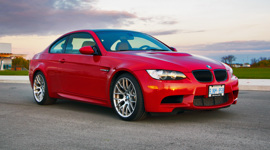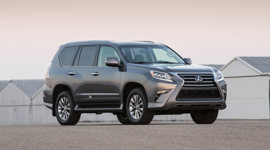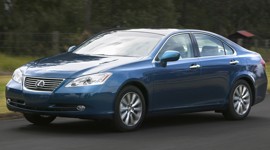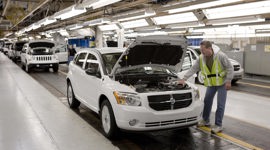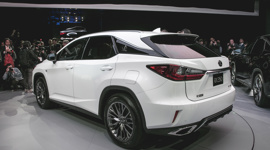Everybody makes car payments. Even if you pay cash, there's a trickle coming out of your pocket every month in terms of depreciation, fuel-costs, and insurance.
For most vehicles in the luxury market, that first factor's a doozie. Simply driving a luxury car off the dealer's lot hits it for a massive initial depreciation – it's a symbol of wealth that you can afford to do so. As a result, more new car luxury buyers turn to leasing as a way to keep costs in line with their desires.
But you've decided to be even smarter than that and let somebody else take that initial hit. Why not pick up that luxury ride after the first several thousand kilometres are on the clock, while it's still in the prime of its life? It's a great way to get the premium quality you want, while saving thousands.
Manufacturers, who have squadrons of lease-return vehicles to move, have created a second-tier sales system for their dealers: the certified pre-owned program. Of course, when buying a used car, you should make sure that it's been properly inspected and that you have access to that inspection, but CPO programs come with many other bonuses too. Here's a look across the board at what each manufacturer brings to the table.
Acura
Acura vets potential CPO candidates fairly comprehensively. Not only is the accident history and general condition inspected, but the service history is pulled to make sure the car has been cared for. As part of the 125-point inspection process, wear items like tires and brakes are required to have more than 50 percent life remaining, and the car or SUV is freshly serviced.
Once the vehicle in question is inspected and any deficiencies repaired, it enters the CPO program and becomes eligible for Acura's extended warranty. The no-cost option, included on any CPO Acura, provides coverage for engine, transmission, steering, and all-wheel-drive systems, for a total of seven years or 130,000 km from in-service date. If you'd like a more comprehensive coverage, that's available, but at an additional cost.
Not all Acura dealerships are part of the certification process, as there are factory-required guidelines to participate. If the vehicle falls within Acura's general guidelines (less than six years old, with fewer than 129,000km), the onus is on the dealer to label it as certified or not. Certified cars are eligible for reduced financing rates from Acura – currently, the best deal seems to be 2.9 percent financing for 60 months on certified TLs and TSXs, with the popular MDX a percentage point higher.
Audi
Currently, the hottest-selling luxury vehicle of any kind in Canada is the Audi Q5. They've sold thousands of these popular crossovers, so finding a nice, low-mileage example shouldn't be too difficult – though you need to be quick on your feet as the demand is quite high too.
An Audi certified pre-owned Q5 would come with full warranty coverage for six years from the date it went on the road or 160,000km on the odometer – whichever comes first. Coverage includes twenty-four hour roadside assistance, including jump-starting the car, lockout service, and towing to the nearest dealership if the trouble is more serious. As with new Audis, you also have the option to purchase an Audi Care prepaid maintenance plan. If you absolutely intend to keep the car for the duration of plan, these are generally worth it, given that Audi is a stickler about regular maintenance to maintain your warranty.
Like most other certified pre-owned programs, Audi requires an extensive inspection of a vehicle before it is entered into the system. In this case, the checklist in question has 300 specific items, and should be provided directly to you, along with a CarProof report showing any history of collisions, etc.
If this is a second four-ringed purchase for you, Audi has a $400 loyalty bonus on hand. If it's not, there are other enhancements besides, with reduced finance rates. Using our Q5 example, the current rates range from 0.9 percent for 24 months to 3.9 percent for 60 months. Some models, such as the A4, are currently very well supported, with 1.9 percent financing for 60 months.
BMW
BMW's CPO program has been enhanced in the past few years – where once their extended warranty was mostly powertrain-only coverage, it now is essentially identical to the new car warranty. Total coverage from the original in-service date of the car is six years or 160,000km – on a three-year-old lease return, that's plenty.
This extended coverage starts for 2011 BMWs and 2010 Minis, and does leave out the battery. Extending to up-to seven years and 200,000 km is also available, at an additional cost.
BMW retailers have first pick of their lease return cars, meaning that many of the best-quality vehicles can be found back at the dealership they were originally sold at. As it is up to the dealer whether to keep the car or pass it through to the wholesaling process, any car requiring too much in terms of reconditioning, or with an unsatisfactory accident history, tends to go to auction. The dealer gets the pick of the litter, and thus so do you.
While a CPO car can be more expensive from the dealer, there's also a defraying of cost by subvented rates. While standard automotive financing rates or lines of credit can float above prime, BMW offers reduced rates on almost all their certified cars. For a 2011 3-series, for instance, rates are currently as low as 0.9 percent for 24 months and 2.9 percent for 60 months. Compared to ordinary lending rates, that's a variance of thousands of dollars in interest over the CPO car.
Occasionally, BMW will put special rates and financing on specific models, just as they will with new cars. All BMW and Mini retailers across Canada participate in the program.
Cadillac
Like Audi and BMW, Cadillac offers a warranty on its certified cars that takes the existing new car warranty and extends it. In this case, Cadillac will cover your car bumper-to-bumper for up to six years or 113,000km (70,000 miles).
The Cadillac inspection process claims 172-points, but it's best not to get tied up in how many specific points are on a checklist, as most of the inspection procedures across all manufacturers are equally rigorous. Once passed into certified status, there's also the ability to option premium care, a maintenance package that covers the costs of oil and filter changes, air filter replacement, tire rotation, and other basic maintenance. You used to only be able to get this on new Cadillacs, but the company now offers it across the range.
One of the more-interesting things available on a certified Cadillac is a 30-day exchange privilege. It's capped at 2,500 km for distance, but essentially, if you change your mind about the colour of Escalade you wanted, then you can swap it back in for something else.
Infiniti
Even as Infiniti's marketing department labours to explain its new Q-based nomenclature, they'll still happily sell you a nice used G37. A solid buy, the all-wheel-drive Infiniti sport sedans are a favourite among Canadians.
If an Infiniti is less than seven years old with fewer than 120,000 km, with a clean accident history, it has to pass a 160-point inspection to clear certified status. If getting up to the grade is going to cost more than the threshold minimum profit set by the dealer, the dealer may choose not to certify the car – thus, usually only very well-cared for vehicles pass into certified status. Having said that, that doesn't mean there's anything wrong with a non-certified car, as a dealership may choose not to put the extra cost into certification process and instead offer a more aggressive price point on the car.
However, all Infiniti dealerships, if certain training has been completed, are capable of offering certified cars, and certified vehicles qualify for reduced rates, occasionally as low as one percent in the short term. Rates are set regionally, with the highest volume of cars fetching most aggressively marketed – hence, perhaps a good way to get a deal on that strong-selling G-sedan.
Warranty enhancements from Infiniti aren't quite as comprehensive as the German marques, with an additional two years and 40,000 km of powertrain warranty added on top of what factory warranty remains. If you wish to add in more coverage, you can do so in sensible one year, 20,000 km increments.
Jaguar/Land Rover
Jaguar and Land Rover are extremely specific about the specifics of what can be vehicle befitting their certified program. Only OEM windshields and brake pads must be fitted, and the latter must have a minimum of 6 mm remaining – or be replaced. Any Jag or Landie older than five years is unacceptable, and the mileage must be below 96,000 km.
Assuming the vehicle in question passes this first hurdle, it is then up to the dealer to inspect and pass the vehicle into certified status – a 150-point inspection. Once in, Jaguar and Land Rover's extended warranty is comprehensive, apart from wear-and-tear and maintenance items, and extends to six years or 160,000 km, whichever comes first. Currently, there is no further factory-supported warranty available, or at least not yet.
As with other manufacturers, Jaguar and Land Rover offer reduced rates, mostly in the 2.9 percent to 3.9 percent range. For instance, a 2011 Range Rover Sport would currently be eligible for up to 60 months financing at 2.9 percent.
Lexus
Probably the most interesting thing about a Lexus certified pre-owned vehicle is that you can actually lease it if you want. That shows considerable company confidence in the strong resale of their vehicles. Lease and finance rates are the same across the entire suite of used Lexus models, with leasing ranging from 1.8 percent for 24 months to 3.8 percent for 48 months, and financing spreading from 1.8 percent at 24 months to 4.8 percent at 60 months.
As elsewhere, it's up to the dealership to inspect (131 point) and certify the car, and all are equipped to do so. Wear items like tires, brakes, and even the spare tire are required to have at least 50 percent life remaining, and the car can be no older than six model years with a cap set at 110,000 km.
Warranty coverage is for two years or 40,000 km from your purchase date, and covers only the powertrain. However, there are a number of extended warranty options, and these are transferable.
Mercedes-Benz
Mercedes' move to position the CLA250 as an entry-level three-pointed-star for a new generation of owners is working very well, if the sales are anything to go by. However, if you want to check out the real bargain-Benz, you'll want to take a look at a certified pre-owned C-class from 2011-12.
The certification process at Mercedes has two levels: the first, Star-Certified, is only available to vehicles five years old or newer, or with less than 100,000 km; the longer-term Extended Limited Warranty can be applied to cars up to seven years old or 140,000 km total. You're unlikely to find the latter advertised on the lot, but Certified status can be conferred onto an older Benz.
Standard warranty on Star-Certified cars covers powertrain and major components for a total of six years from in-service date or 120,000 km – it doesn't include bumper-to-bumper coverage. The only factory extension you can put on your certified-series Mercedes is to extend the powertrain warranty for a further year and additional 20,000km.
The real advantage of the Mercedes-Benz certified car is in the financing, which is very aggressive. Currently, used certified C-classes from 2011-2012 are being offered with 0.9 percent financing for up to 60 months. That's slightly better than you'll do on a Honda Civic!
Porsche
What you really need to buy a nice used air-cooled Porsche is some sort of short-range time machine to travel back before they started shooting up in value. To get a nice used Panamera or Cayenne, there's no time like the present.
Porsche can certify their cars back as far as eight years old, and after a typically teutonically rigorous inspection, the car is covered for a lengthy period. If it's a Cayenne that's still in the factory warranty period, you're good up until six years from the in-service date, or 160,000 km total. If it's an older Boxster you're looking at, with expired factory warranty, you're covered for two years or 80,000 km from point of sale (as long as the odometer again doesn't exceed 160,000 km total).
While there isn't the same financing incentive as elsewhere, the Porsche warranty is very comprehensive, and as parts are expensive, will likely pay for itself. Moreover, Porsche's reconditioning process is particularly thorough, and results in cars that are in particularly good condition.
Volvo
Volvo's CPO program falls into like with most of the others, providing a six-year, 160,000 km warranty that covers most items, including air-conditioning, powertrain, electrical, and suspension. Certification takes a 130-point inspection, and cars involved in major collisions are excluded – always ask to see a report, naturally.
Roadside assistance is part of the Volvo On-Call system, which also includes something interesting called “Trip Routing.” Apparently, Volvo will send you maps for your next road trip, highlighted for the most-direct or most-scenic route. Neat.
As with other manufacturers, Volvo has some reduced rates available on their Certified cars, currently starting out at 1.9 percent.
Check out our CPO Comparison Tool.
